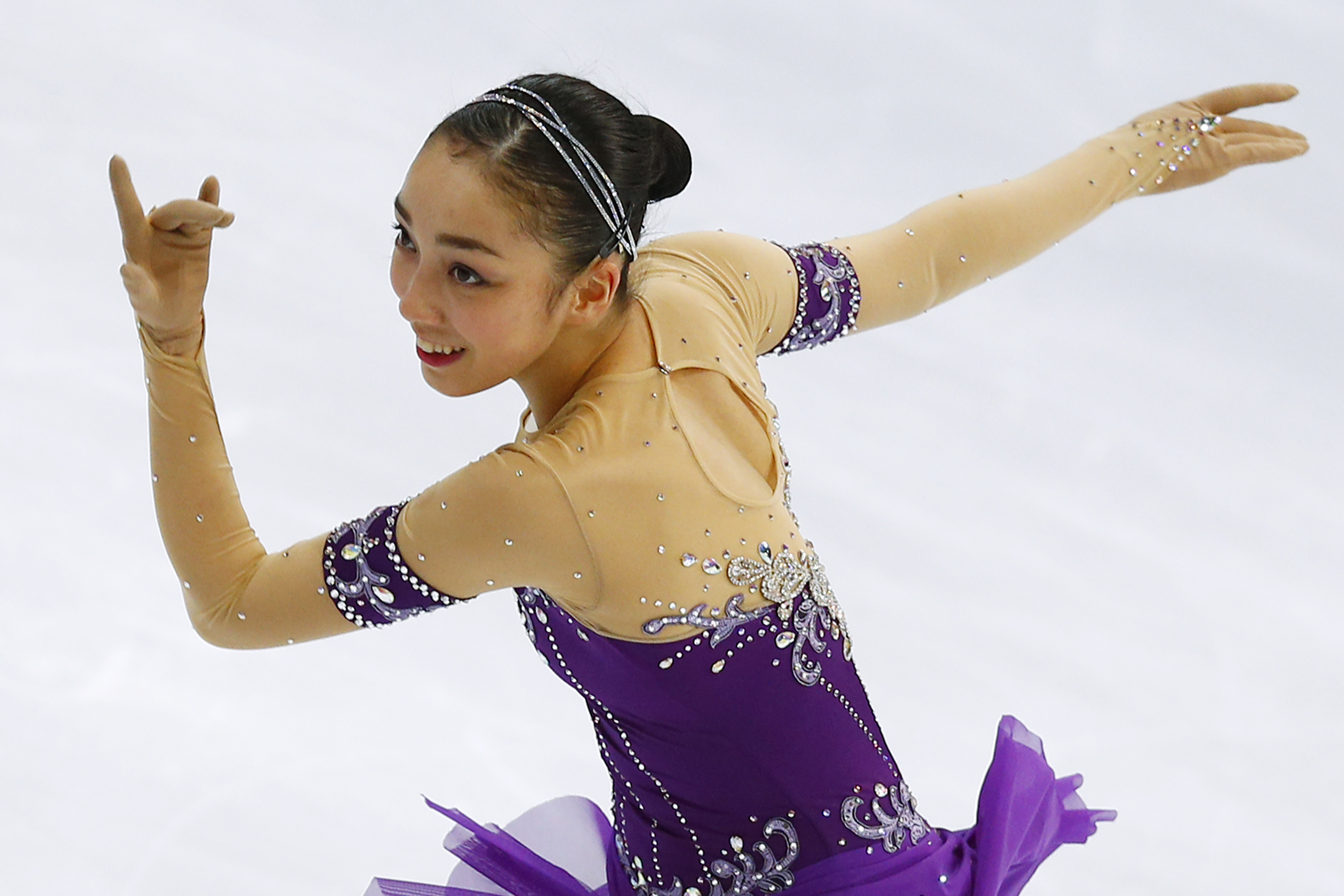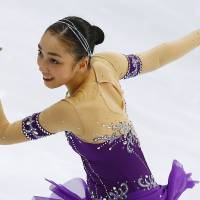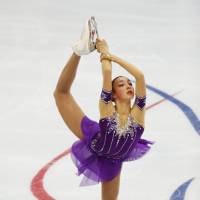Japan's strong showing in the Grand Prix season continued with Rika Hongo's victory at the Cup of Russia on Saturday. Hongo's triumph marked the third time in four weeks that Japan has taken the gold at one of the GP events.
Tatsuki Machida (Skate America) and Takahito Mura (Skate Canada) won the opening two weekends, and Yuzuru Hanyu was in position for a title at the Cup of China the third weekend of the season before being injured in the unfortunate accident with Yan Han during the six-minute warmup prior to the free skate.
The casual skating fan may not be familiar with the 18-year-old Hongo, who's impressive free skate to "Carmen" wowed the judges and crowd. Though Hongo may be an unknown to many, her resume is short but impressive.
The Sendai native was Japan's junior champion last season after posting two podium finishes in her two seasons on the Junior GP circuit. She finished a very respectable sixth at the senior nationals in 2013, where she held her own in a field that included Akiko Suzuki, Kanako Murakami and Mao Asada. Hongo came in one spot ahead of two-time world champion Miki Ando, who finished seventh.
Hongo, who stands 166 cm, began this season with a victory in the warmup Asian Trophy in Taipei in August and a third-place showing at the Finlandia Trophy in October. She was fifth in her debut on the senior GP circuit at Skate Canada.
Looking stunning in a black and red outfit, Hongo gave an outstanding performance in her free skate in Moscow. She hit five triple jumps, had two level-four spins and a level-four step sequence. Her score of 118.15 was a personal best.
Hongo lives in Nagoya now and trains with coach Hiroshi Nagakubo, best known for his long partnership with Suzuki. The stoic Nagakubo could not hide his pleasure with Hongo's performance when she came off the ice after the free skate on Saturday night.
The result at the Cup of Russia gives Hongo an outside chance at a spot in the GP Final in Barcelona, Spain, next month. She could be joined there by Hanyu, Machida, Mura and Murakami, depending on their results in the remaining GP events.
Japan's depth in the younger age group is illustrated by the fact that five of the 12 skaters at the Junior GP Final will be Japanese.
Over the top: Speaking of Hanyu, there has been a variety of opinions issued about the aftermath of his brutal crash with Yan in Shanghai. While everyone is entitled to their own feelings, unfortunately the misinformed often gain more recognition when they speak out.
In this case, I'm referring to the comments of former Olympic judoka Noriko Mizoguchi on Hanyu being allowed to skate after the accident. It quickly became vogue to bash the Japan Skating Federation for letting the Olympic and world champion continue and Mizoguchi was just one of those who piled on.
Writing in Nikkan Sports two days after the incident, Mizoguchi ripped the JSF as "irresponsible" and twice referred to skating as "a non-contact sport."
Really?
Has Mizoguchi ever been to a skating practice and seen how many times the skaters jump, fall and then slam into the ice?
Obviously not.
Sorry to inform Mizoguchi, but there are no pads in skating like in judo. Vancouver Olympic champion Evan Lysacek recently stated that he believed he had suffered "at least 15 concussions" during his skating career.
While that is unfortunate, the reality is that short of putting helmets on the skaters or eliminating all jumps, there is nothing that can be done to prevent concussions in skaters.
That's just the way it is.
Hanyu showed guts by continuing. He knew that if he pulled out his chance of defending his GP Final title would be gone. He was checked out by the medical staff on site and his coach Brian Orser and it was determined that Hanyu could continue.
Orser said he allowed Hanyu to compete because he didn't show any physical signs of a concussion. Orser said Hanyu's eyes were clear and he was speaking normally, even making jokes.
"He immediately determined he wanted to compete, and for me, I wanted to make sure he was healthy enough," Orser said. "I told him, 'This is not the time to be a hero. You have to take care of yourself.' "
Seeing Hanyu fall five times in his free skate was painful, but it was his choice to carry on. Blasting the JSF after the fact is pointless.
Hanyu is the Olympic and world champion, you think he might know his body just a bit better than some critic sitting at home watching on TV?
Good grief.
Mizoguchi's view is one of political correctness that seems so prevalent in society today. People like her are the same ones who think youngsters should not play American football because of the dangers.
The reality is that kids are more likely to be injured in automobile or bicycle accidents than they are playing sports.
Mizoguchi giving advice on skating is like Michelle Kwan opining on judo. The difference is, Kwan would know better.
Jumping the gun: Sportscaster and former skater Mai Asada quickly shot down a Hochi Sports report last week that she was engaged to Japanese singer DEppa and would be married next spring.
Mai, the older sister of three-time world champion Mao, is 26 now and based in Nagoya. The beautiful Mai resembles her late mother Kyoko.
Mai responded to the marriage story by writing on Twitter: " . . . I never thought I would hear I was getting married from a friend."
The whole episode reminds me of something Frank Sinatra once said.
"Never marry a singer."





















With your current subscription plan you can comment on stories. However, before writing your first comment, please create a display name in the Profile section of your subscriber account page.